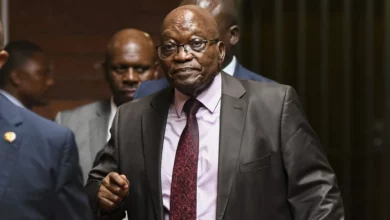“This is a symposium of love, a symposium from the heart,” Soheir Abdel Kader, Vice President of the 34th Cairo International Film Festival stated, her free hand reaching out to the audience. Behind Abdel Kader sits a panel of distinguished African filmmakers, or as she called them, “friends of the festival, who always attend without having to be asked.”
This panel, or “meeting of close friends,” was organized by the festival in an effort to pay tribute to African cinema. As Abdel Kader herself pointed out, this is not the first time the CIFF has chosen to honor the continent’s filmmakers.
“We are part of Africa, and Africa is a part of us,” said Abdel Kader, smiling.
This year’s symposium is moderated by acclaimed Nigerian director, and jury president at last year’s edition of the CIFF, Victor Okhai. It attempted to “answer, once and for all: what is African Cinema?”
“So much is said about world cinema,” Okhai, dressed in a bright red traditional Nigerian attire, addressed his audience. The biggest problem that faces African Cinema, Okhai claimed, is the fact that it’s so hard to define. “What is African cinema?” he asked. Okhai argues that much of the disambiguation stems from the funding behind African movies, which he believes “should not be defined by the funders sitting in a café in Paris, acting as gatekeepers for the stories being told.”
Funding represents only one dimension of the struggle to identify African cinema—there are several other questions that must be answered in order to reach an accurate and comprehensive definition. “Does the term ‘African cinema’ refer to a film that’s shot in Africa, or by an African? Or to a film set in Africa, or with a story told in an African language? Does the film have to be about Africa, or produced with African money?”
Members of the panel each took their turn answering Okhai’s questions, beginning with popular Egyptian actress and respected producer Esaad Younis, who defined African cinema according to its “human value. Africa represents the origin of humanity and civilization, the origin of storytelling,” she explained.
“An African film is any film that manages to capture the spirit of the continent, the spirit from which the whole world sprang. It doesn’t matter where the filmmaker is from—if they catch that spirit and those values, they have made an African film.”
Veronique Joo’Aisenberg, Manager of the African Cinémathèque at CULTURESFRANCE, felt differently, stating that the only valid definition was one that was “purely geographical.”
“I am an artist first before being an African,” said Joo’Aisenberg.
Joo’Aisenberg’s comment was met with a booming response from the other end of the panel, as South African Faith Isiakpere proudly announced, “I am an African first”—a statement which was met with a healthy round of applause.
As the lights dimmed, a short clip promoting Isiakpere’s new film—”The Algiers Murders”—began playing. “I have been working as a director since 1974, and anything I have done since then counts as an African film,” Isiakpere explained after the lights came back on. The charismatic filmmaker believes the future of African cinema to be promising. One reason for his optimism is the increasingly widespread availability of superior technology—”The Algiers Murders,” he states, was shot using the ultrahigh-resolution RED camera. Technology is “no longer a valid excuse,” Isiakpere said.
“As an African, I pour my culture and originality into whatever I make,” Isiakpere says. However, that doesn’t necessarily mean having exclusively African inspirations. The story behind “The Algiers Murders” is taken from a true-life account of murder and subsequent police vigilantism in the United States (specifically in Algiers, Louisiana). “The story may be from the US, but every person you see in the credits is African,” he claimed.
Agreeing with Isiakpere was his "Algiers Murders" producer Firdoze Bulbulia, an established director and screenwriter in her own right. Starting her answer by passionately declaring, “God bless Africa!” while brandishing a vuvuzela, Bulbulia mentioned her Muslim faith, Arab name, Indian descent, and the fact that she comes from South Africa, where she and her family members were “classified as being black, because of the history of apartheid.”
According to Bulbulia, one of the main problems facing African cinema is the globally recognized view of the continent, which the West promotes for its own benefit. “There are so many countries, we think we can just lump them together and call it Africa, and that comes with the connotations of the western world’s interpretation of Africa—the dark continent, savage and uncivilized,” Bulbulia explained, before describing an exercise she regularly tries with younger people. “I ask them to write down on a piece of paper one statement about Africa.” Bulbulia claims to be amazed at how “what they came up with was always what the West wants us to think about Africa: disease, starvation, AIDS, war.” Never, she insisted, do they bother to focus on the continent’s diversity, or wide variety of cultures.
Initially, Bulbulia had her reservations about financing “The Algiers Murders.” “I felt like I could not use African money to tell an American story,” she explained. Eventually, though, she came to realize that, “even though it is set in the US and yes, it is about a white cop killed by a black man, it is also a story about good vs. evil, greed, corruption, and the mafia.” She added, for clarification, that “the word ‘mafia’ could mean anything.”
Bulbulia believes that the true definition for African cinema will become clearer in time with young filmmakers who she advised to “stay true to themselves, tell their story with passion, and believe in their craft.”
“Being African comes first. You start at birth, everything else comes later. Where did I start? In Africa.”
Michel Ouédraogo, Managing Director of the FESPACO (The Panafrican Film and Television Festival of Ouagadougou), smiled as he gave his answer. “African cinema contributed to the liberalism of the African people, and for that, I say thank you, colonialism!” Ouédraogo laughs, adding. “They gave us cinema, and we used it as a weapon against them.”
Ouédraogo quickly turned serious. “African cinema has benefited from outside funding—this is a fact of life.” The problem with that setup is the accompanying rule which states, as Ouédraogo puts it, “He who pays the bill asks for the menu. We need to be able to pay the bill, so that we can ask for the menu.”
African governments, he states, cannot be relied on. “They think that development comes only from agriculture and industries. They do not realize that film is an industry too.”
“Without mobilization at a political level, we can’t succeed,” Ouédraogo insists. “This is something all African filmmakers need to realize.”
“Maybe the problem is that we’re trying to define an entire continent, and not a single country,” Egyptian producer Esaad Younis says, in closing. However, she believes that if anything, globalization will help solve the African Cinema industry’s identity crisis. “Because of globalization, people have started to long for their roots.” As an example, she cites the early immigrants who made a home for themselves in the United States. “The first waves of migrants were ecstatic when granted their passports. But today’s younger generations are starting to yearn for the cultural origins.”
Younis is optimistic that the work of young African filmmakers will pave the way towards a stable, if not prosperous, industry. “These new films are a beacon, a compass pointing us in the right direction,” she says. “If we’re looking for a definition, all we need to do is follow that compass.




